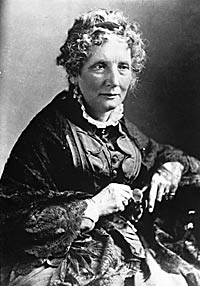Readings:
Psalm 94:16-23
Isaiah 26:7-13
1 Peter 3:8-12
Matthew 23:1-12Preface of Advent
PRAYER (traditional language)
Gracious God, we offer thanks for the witness of Harriet Beecher Stowe,
whose fiction inspired thousands with compassion for the shame and sufferings
of enslaved peoples, and who enriched her writings with the cadences of
The Book of Common Prayer. Help us, like her, to strive for thy justice,
that our eyes may see the glory of thy Son, Jesus Christ, when he comes
to reign with thee and the Holy Spirit in reconciliation and peace, one
God, now and always. Amen.
PRAYER (contemporary language)
Gracious God, we thank you for the witness of Harriet Beecher Stowe,
whose fiction inspired thousands with compassion for the shame and sufferings
of enslaved peoples, and who enriched her writings with the cadences of
The Book of Common Prayer. Help us, like her, to strive for your justice,
that our eyes may see the glory of your Son, Jesus Christ, when he comes
to reign with you and the Holy Spirit in reconciliation and peace, one
God, now and always. Amen.
This commemoration appears in A Great Cloud of Witnesses.
Return to Lectionary Home Page
Webmaster: Charles Wohlers
Last updated: 4 May 2019
HARRIET BEECHER STOWE
WRITER AND PROPHETIC WITNESS, July 1, 1896
 Harriet
Beecher Stowe (June 14, 1811 – July 1, 1896) was an American abolitionist
and author. Stowe's novel Uncle
Tom's Cabin (1852) depicted life for African-Americans under
slavery; it reached millions as a novel and play, and became influential
in the United States and United Kingdom and made the political issues
of the 1850s regarding slavery tangible to millions, energizing anti-slavery
forces in the American North, while provoking widespread anger in the
South. Upon meeting Stowe, Abraham Lincoln allegedly remarked, "So
you're the little lady who started this great war!" The quote is
regarded as apocryphal.
Harriet
Beecher Stowe (June 14, 1811 – July 1, 1896) was an American abolitionist
and author. Stowe's novel Uncle
Tom's Cabin (1852) depicted life for African-Americans under
slavery; it reached millions as a novel and play, and became influential
in the United States and United Kingdom and made the political issues
of the 1850s regarding slavery tangible to millions, energizing anti-slavery
forces in the American North, while provoking widespread anger in the
South. Upon meeting Stowe, Abraham Lincoln allegedly remarked, "So
you're the little lady who started this great war!" The quote is
regarded as apocryphal.
Harriet Beecher was born in Litchfield, Connecticut on June 14, 1811. She was the daughter of outspoken religious leader Lyman Beecher and Roxana Foote, a deeply religious woman who died when Stowe was four years old. She was the sister of the educator and author, Catharine Beecher, clergymen Henry Ward Beecher, Charles Beecher, and Edward Beecher.
Harriet enrolled in the seminary run by her eldest sister Catharine, where she received a traditionally "male" education. At the age of 21, she moved to Cincinnati, Ohio to join her father, who had become the president of Lane Theological Seminary, and in 1836 she married Calvin Ellis Stowe, a professor at the seminary and an ardent critic of slavery. The Stowes supported the Underground Railroad and housed several fugitive slaves in their home. They eventually moved to Brunswick, Maine, where Calvin taught at Bowdoin College.
In 1850, Congress passed the Fugitive Slave Law, prohibiting assistance to fugitives. Stowe was moved to present her objections on paper, and in June 1851, the first installment of Uncle Tom's Cabin appeared in the antislavery journal National Era. The 40-year-old mother of seven children sparked a national debate and, as Abraham Lincoln is said to have noted, a war. Stowe died on July 1, 1896, at age eighty-five, in Hartford, Connecticut.
— more at Wikipedia